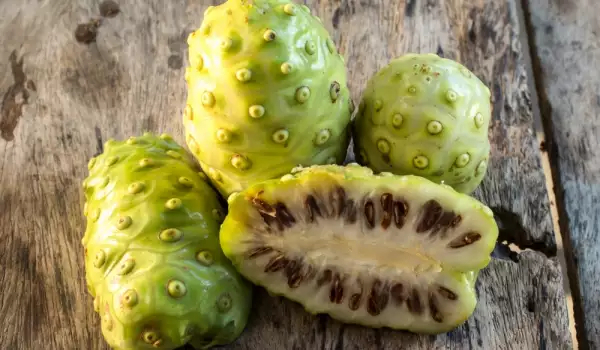Noni is the fruit of the evergreen tree Morinda citrifolia which belongs to the Rubiaceae family. It is native to French Polynesia but is found throughout the entire Pacific Ocean region. It has green or yellow fruits.
Noni, also commonly known as Indian mulberry, is a bitter-tasting fruit with an unpleasant smell. Because of this, it is usually taken in the form of powdered extract or liquid concentrate. Noni is exceptionally healthy and medicinal, having earned the nicknames "ancient aspirin" and "Polynesian penicillin".
This small evergreen tree or shrub grows in shady forests, as well as in open areas with sandy and rocky soils. It reaches maturity at 1.5 years of age, at which point it begins giving fruits every month year-round. This tree can also be spotted in volcanic terrain or volcanic shores.
The Morinda citrifolia tree is considered holy for its diverse effects on the human body. The small fruits are the size of a potato but hide exceptionally healthy substances within.
In ages past, tribal medicine men would use noni to treat fever, diarrhea, constipation, animal and insect bites. Many years later, noni wound up in laboratories for testing.
Composition of Noni

The noni fruit is rich in vitamins B3, A and C. Among minerals, the best represented are iron, calcium, potassium and sodium. The fruit contains large quantities of lignans, proxeronine, phytochemicals, polysaccharides, iridoids, catechins, unsaturated fatty acids, alkaloids, beta sitosterol and more. The fruit contains 18 essential amino acids.
3.5 oz (100 g) of noni contains 15 calories, 0.1 g fats, 0.5 g proteins, 3 g carbohydrates.
Choosing and Storing Noni
As mentioned, the noni fruit has way too much of an intrusive aroma and bitter taste to be eaten directly.
For this reason it is sold in stores as a concentrate or in powdered form with a subdued taste. Once the bottle of noni concentrate has been opened, it needs to be stored in the fridge.
Daily Dose of Noni
The recommended daily dose of noni concentrate is 2 tbsp. It's best to take 1 tbsp twice - morning and night. Taking it 30 min. before meals on its own or mixed with another juice or water is most adequate. If taking the powdered extract, the range is 500 to 1000 mg daily.
Benefits of Noni

For over 2000 years, the juice of noni has been especially prized for inhabitants of the Pacific Ocean islands. Noni has excellent antioxidant properties.
Thanks to the alkaloid xeronine found therein, noni strengthens the immune system. It protects against different forms of cancer because it contains the valued substance damnacanthal, known for its anticancer properties.
The proxeronine found in noni affects mammary gland function and boosts production of the hormones serotonin and melatonin. In this way it has a positive effect on the sleep/wake cycle, regulates changes in mood.
Noni is good for the nervous system, it improves memory and concentration. It is the perfect antidepressant, lowering stress levels. Noni lowers blood pressure, protects against heart attack and stroke.
Noni juice is often used as a food supplement for arthritis and other arthritic diseases. It has anti-inflammatory action and is used to treat dependencies. Noni extract slows aging processes of the skin and rejuvenates.
Noni is perfect for diets because it cleanses the body of toxins and speeds up burning of excess fat. The active substances found in it lower the risk of cellular degeneration.
According to researchers, not all of the secrets of noni have yet been revealed. It's highly possible for there to be numerous unknown benefits. According to some American scientists, noni can treat over 100 types of health problems.







